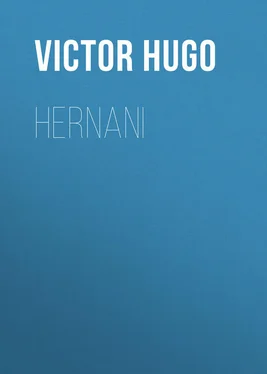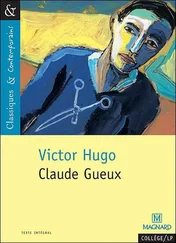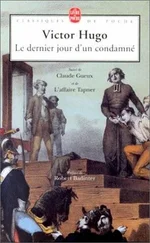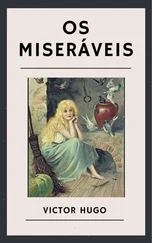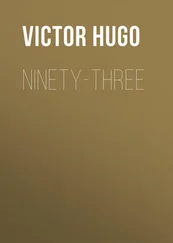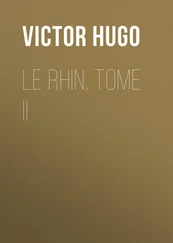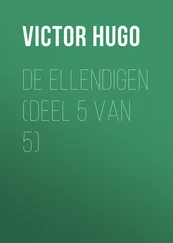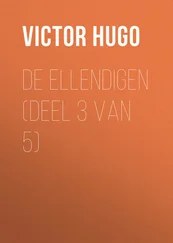Victor Hugo - Hernani
Здесь есть возможность читать онлайн «Victor Hugo - Hernani» — ознакомительный отрывок электронной книги совершенно бесплатно, а после прочтения отрывка купить полную версию. В некоторых случаях можно слушать аудио, скачать через торрент в формате fb2 и присутствует краткое содержание. Жанр: literature_19, foreign_antique, foreign_prose, на французском языке. Описание произведения, (предисловие) а так же отзывы посетителей доступны на портале библиотеки ЛибКат.
- Название:Hernani
- Автор:
- Жанр:
- Год:неизвестен
- ISBN:нет данных
- Рейтинг книги:3 / 5. Голосов: 1
-
Избранное:Добавить в избранное
- Отзывы:
-
Ваша оценка:
- 60
- 1
- 2
- 3
- 4
- 5
Hernani: краткое содержание, описание и аннотация
Предлагаем к чтению аннотацию, описание, краткое содержание или предисловие (зависит от того, что написал сам автор книги «Hernani»). Если вы не нашли необходимую информацию о книге — напишите в комментариях, мы постараемся отыскать её.
Hernani — читать онлайн ознакомительный отрывок
Ниже представлен текст книги, разбитый по страницам. Система сохранения места последней прочитанной страницы, позволяет с удобством читать онлайн бесплатно книгу «Hernani», без необходимости каждый раз заново искать на чём Вы остановились. Поставьте закладку, и сможете в любой момент перейти на страницу, на которой закончили чтение.
Интервал:
Закладка:
Word was passed about among those who regarded Hugo's new theories with aversion, and a large and mainly hostile audience was assembled on that memorable night, the most eventful premiere since the first representation of Corneille's «Cid», nearly two hundred years before. Everybody knows what happened. Everybody knows how fashion and aristocracy and journalism combined to kill the new piece, which was said to have been written in defiance of the rules followed by Racine and Voltaire; how the regular theatre-goers hissed, and were howled at in turn by the worshippers of novelty, frowsy, long-haired young artists and penny-a-liners and students, from the left bank of the Seine, who had been brought over to support the play. One of the most sacred institutions of the French theatre is the claque , or body of hired applauders. Now on this occasion there was no claque , for the friends of Victor Hugo had distributed free tickets in the Latin Quarter, and their recipients were present, ready to raise the roof if necessary. The hissing and hooting began almost with the first line, and continued for several hours, until the actors had mouthed through the whole tragedy; and yet it was considered that «Hernani» had won the day.
To us such a way of supporting the fine arts and defending the canons of literary taste, indeed even such widespread and frenzied interest in anything except business, sport, politics, and religion, seems, to say the least, remarkable. But we must remember that the French go to the theatre even more than we go to church; that in February 1830 it was not safe to get excited about politics in Paris; that athletics were neglected in France previous to 1871; and that possibly the French might disagree with us in our estimation of business as the chief end of man. But although I admire the French for this fine capability of theirs, – this capability of taking an excited interest in the things of the mind, I cannot help thinking that the critics and historians have made too much of that fracas on the 25th of February, 1830, in the Théâtre francais. They tell us that this was the first great fight between the Romanticists and the Classicists.
We can learn what these words mean only by getting the critics to indicate to us a piece of art-work constructed according to the Romanticists and another constructed according to the Classicists, and then comparing them and picking out the essential differences. They say «Hernani» is a drama of the Romanticists, and that seventeenth-century tragedy was classical. We find, indeed, that Victor Hugo's drama differs from Racine's; «Hernani» is based upon life in Spain, and not in Greece or Rome, and the period is the sixteenth century, and not the age of Pericles or Tiberius Caesar. But if this is all, then Corneille was a Romanticist, for his first successful tragedy, the «Cid», is also a drama of Spanish life, and is set, moreover, in the Middle Ages. But, they say, this is not all: «Hernani» is romantic because it contains a mingling of the comic and the heroic, inasmuch as there are in it words and notions of common use, where the author might have employed expressions and ideas consecrated and set apart wholly to the service of poetry.
And this is true. Victor Hugo does use both phrases and thoughts that no writer of French tragedy had dared to use before. And here, rather than anywhere else, do we find what we mean when we say he was a Romanticist. I have heard one definition of the term as applied to French literature, which said that the essence of Classicism was the seeking of material in the life of Greece and Rome, and that the essence of Romanticism was the seeking of material in the life of the Middle Ages. The true definition, I think, however, is this, if any be possible: Classicism in literature consists in limiting the choice of a writer within a certain range of special terms and special ideas, these terms and these ideas being such as the best authors of the past have considered beautiful and appropriate. Romanticism is the theory – a more generous one – which would permit and encourage a writer to look for his material and his terms among thoughts and expressions more common in everyday experience, with large freedom of choice. As a matter of fact, the poet who is no longer bound by the examples of Racine and Voltaire will naturally turn to the Middle Ages for inspiration and material, because Racine and Voltaire have nearly exhausted the resources of Greece and Rome.
It would be foolish to take pride in the discovery, for so much has been written on this subject that surely some one has expressed my idea long ago; but I do think that the whole question of Classicism, and the thing itself, sprang almost entirely from Racine. At any rate they are purely French in origin. The old stupid German Classicism which Lessing demolished, the eighteenth-century English Classicism which Scott and Wordsworth demolished, both had their source in France. And in France Racine ruled supreme. He built his tragedies after a severe pattern, and made them very beautiful, but wholly artificial. People liked them, in that stiff and conventional age, and were far enough from investigating whether they and the dramas of Sophocles and Seneca were in truth built on the same plan. They took that for granted. Henceforth to their minds there was only one way of making a tragedy: it must not violate the three unities, of time, place, and action; it must deal exclusively with exalted, heroic, and terrible emotions; it must contain only poetical expressions; it must be composed in Alexandrine couplets, with certain minor points of agreement with the versification of Racine. In short, a writer of tragedy must think like Racine and rhyme like Racine, and, above all, he must never under any circumstances employ a term or indicate an action which might be called vulgar. From France the fashion spread all over Europe. It affected Italy, even down to Alfieri, who at the end of the last century was hampered by this spirit of obedience to Racine. It made English literature of the eighteenth century what it was, and kept it from being what it might have been. Her acceptance of this theory was one of the reasons why Germany had no literature of great account from the time of Luther and Hans Sachs to the day of brave old Lessing, who was the first man of consequence to see what was the matter, and to set to work remedying it by destructive criticism and constructive example. If it is the glory of Germany that her Lessing was the sharpest-eyed man in Europe and the first person sound enough, independent enough, blunt enough, and skilful enough to change the fashion; to us of English speech belongs the pride of saying that it was back to Shakespeare's large humanity that the reformers turned. For Shakespeare is the great Romanticist. It was in Shakespeare that Lessing, Goethe, and Schiller, and the later German Romanticists, whether as critics or translators or poets, studied literary art. The Germans Tieck and Schlegel and Herder and von Arnim, justly celebrated as students of mediaeval literature and as original producers, were pre-eminently Shakespearean scholars. And now the French make a great stir of self-gratulation when, as late as 1830, one of their own poets falls into line and discovers that Shakespeare, and not Racine, had defined the true boundaries of the tragedian's art.
Racine tolerated no mingling of the comic and the tragic, as if laughter never followed tears. Shakespeare constantly mingles them. Racine would have been horrified at the thought of descending occasionally to prose, or introducing real songs (the choruses in «Esther» are hardly of that character) in tragedy. Shakespeare, better acquainted with this mad, sweet, awful world of ours, is no more afraid of sudden contrasts than Nature is herself. Racine could never have brought himself to say «handkerchief» in a tragedy. Shakespeare does not say that Othello demands of Desdemona a quadrangular tissue of snowiest cambric, but comes plump out with the word, and it wrecked Alfred de Vigny's French translation of «Othello» when it was first performed in Paris, in 1829, and the actor uttered the unhappy word mouchoir .
Читать дальшеИнтервал:
Закладка:
Похожие книги на «Hernani»
Представляем Вашему вниманию похожие книги на «Hernani» списком для выбора. Мы отобрали схожую по названию и смыслу литературу в надежде предоставить читателям больше вариантов отыскать новые, интересные, ещё непрочитанные произведения.
Обсуждение, отзывы о книге «Hernani» и просто собственные мнения читателей. Оставьте ваши комментарии, напишите, что Вы думаете о произведении, его смысле или главных героях. Укажите что конкретно понравилось, а что нет, и почему Вы так считаете.
